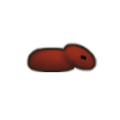Boomrat
Boomrat
"Either by deliberate genetic weaponization, or as an unusual defense mechanism, these rodent-like creatures create a powerful fire-starting explosion when killed."
Base Stats
Pawn Stats
- Move Speed
- 4.60 c/s
- Health Scale
- 40% HP
- Body Size
- 0.2
- Mass - Baby
- 2.4 kg
- Mass - Juvenile
- 6 kg
- Mass - Adult
- 12 kg
- Carrying Capacity
- 15 kg
- Filth Rate
- 1
- Hunger Rate
- 0.56 Nutrition/Day
- Diet
- omnivorous
- Life Expectancy
- 8 years
- Manhunter Chance
- 2%
- Manhunter Chance (Taming)
- 1.25%
- Trainable Intelligence
- None
- Wildness
- 75%
- Minimum Handling Skill
- 7
- Nuzzle Interval
- 2.5 days
- Maturity Age
- 0.35 years (21 days)
- Comfortable Temp Range
- -15 °C – 40 °C (5 °F – 104 °F)
Production
- Leather Yield
- 15
 lightleather
lightleather - Gestation Period
- 14 days
- Offspring Per Birth
- 1-3
Melee Combat
Boomrats inhabit arid shrublands and temperate forests. They create a powerful fire-starting explosion when killed, including when they are slaughtered, so be careful of that.
Boomrats are best hunted while it is raining because the rain will extinguish the fire that they make when they die, saving the colonists the job of putting it out.
They will also eat your crops if given the chance.
Taming
Tamed Boomrats are useful Release animals in raids or certain events, although they should be kept away from the main base (particularly the flammable parts).
Tactics
They are a smaller version of the Boomalope and spawn in areas where the ground is mostly flammable. Like the Boomalope they are a punishment for being in an area with a long or year round growing season, and are very dangerous to settle near for a permadeath settlement as a man hunter pack of them can create a devastating fire with no hope of being stopped, that will eventually melt through steel. It is very hard for your colony to put the fire out until it rains. Consider avoiding them, and keeping them healthy. They are much less dangerous in rain, so consider exterminating as much of them as you can if it rains, or taming them to sell them, slaughter them in a lake, or an area with no risk of fire, such as a room with a firefoam popper or stone floors, if you ever lack the meat for high quality meals.
Training
This animal can be trained as follows:
| Guard: | |
|---|---|
| Attack: | |
| Rescue: | |
| Haul: | |
*As of version 1.1.2610, all animals can be tamed. The percentage of likelihood of success depends on factors such as the Animals Wildness Percentage, Pawn Handling Skill, and others. More information can be found on the animals page.
Health
Lore
The origin of the boomrat has varied over time. In the initial release of the Revival Briefing, which is now considered non-canon, they were described as originating as a biological weapon that survived and bred after wars on the worlds they now inhabit. The current version of the Revival Briefing states that they, along with the boomalope, were originally engineered as a primitive renewable fuel source. While this holds true for boomalopes, boomrats cannot and could never be milked for chemfuel like boomalopes in-game which seems to contradict this purpose. Meanwhile, their current in-game description also disagrees with the current briefing and supports the now-obsolete original version, stating that their explosive tendencies are either a result of deliberate weaponization or intended as a defense mechanism.
